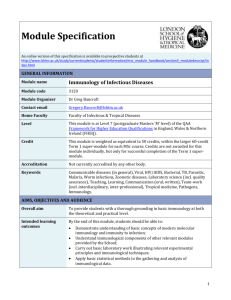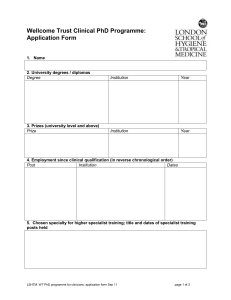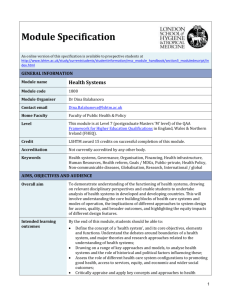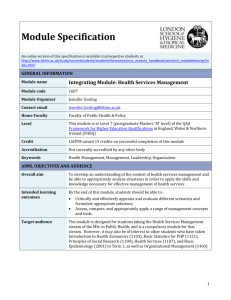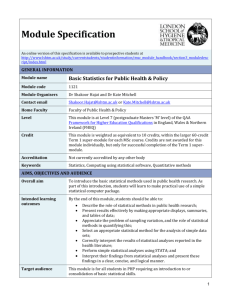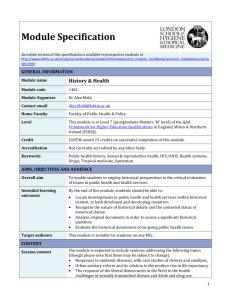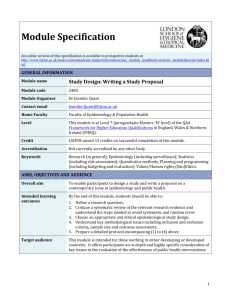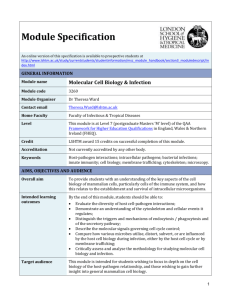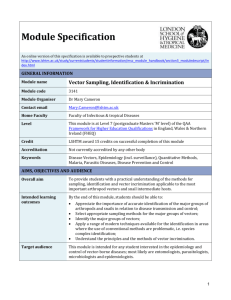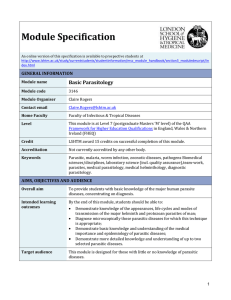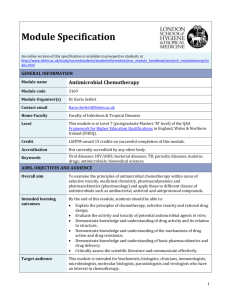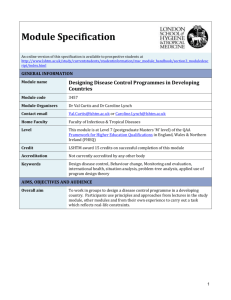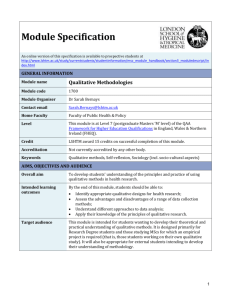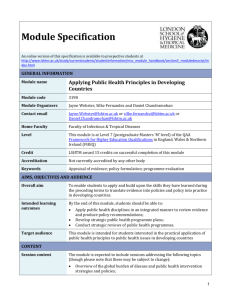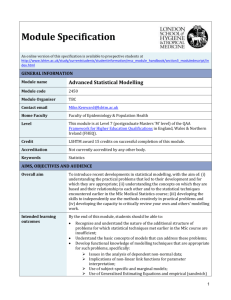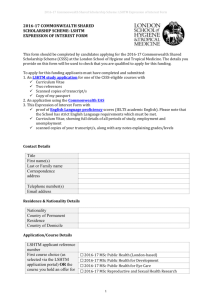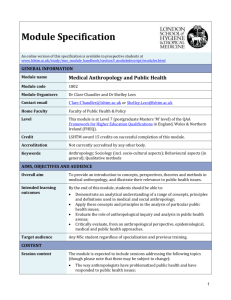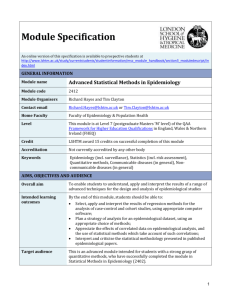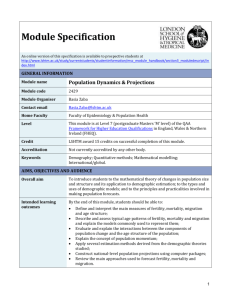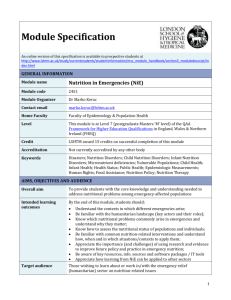3000 Extended Project Module Specification
advertisement
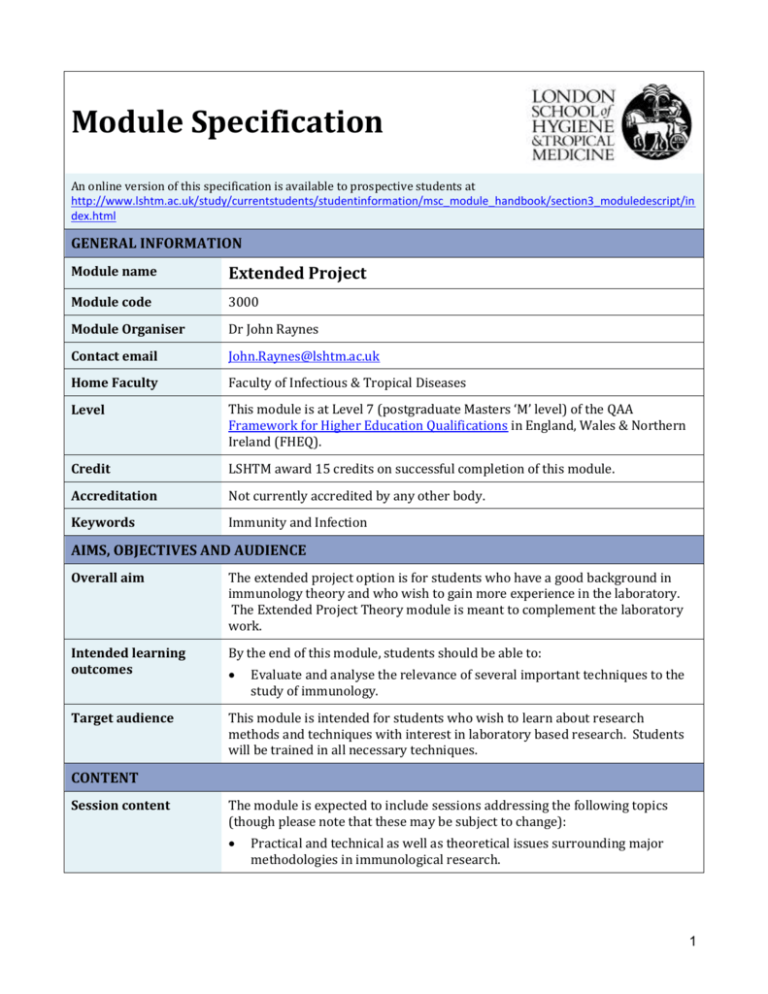
Module Specification An online version of this specification is available to prospective students at http://www.lshtm.ac.uk/study/currentstudents/studentinformation/msc_module_handbook/section3_moduledescript/in dex.html GENERAL INFORMATION Module name Extended Project Module code 3000 Module Organiser Dr John Raynes Contact email John.Raynes@lshtm.ac.uk Home Faculty Faculty of Infectious & Tropical Diseases Level This module is at Level 7 (postgraduate Masters ‘M’ level) of the QAA Framework for Higher Education Qualifications in England, Wales & Northern Ireland (FHEQ). Credit LSHTM award 15 credits on successful completion of this module. Accreditation Not currently accredited by any other body. Keywords Immunity and Infection AIMS, OBJECTIVES AND AUDIENCE Overall aim The extended project option is for students who have a good background in immunology theory and who wish to gain more experience in the laboratory. The Extended Project Theory module is meant to complement the laboratory work. Intended learning outcomes By the end of this module, students should be able to: Target audience This module is intended for students who wish to learn about research methods and techniques with interest in laboratory based research. Students will be trained in all necessary techniques. Evaluate and analyse the relevance of several important techniques to the study of immunology. CONTENT Session content The module is expected to include sessions addressing the following topics (though please note that these may be subject to change): Practical and technical as well as theoretical issues surrounding major methodologies in immunological research. 1 TEACHING, LEARNING AND ASSESSMENT Study resources provided or required Research papers, laboratory research project work. Teaching and learning methods Guidance on appropriate techniques to be reviewed will be provided by the Module Organiser. The student will then need to undertake database searches on these methods and evaluate their usefulness by reference to recent cutting edge publications. Assessment details The assessment task for this module will be an essay relating to the techniques that have been most valuable in generating advances in the field of infectious disease immunology. For students who are required to re-sit, or granted a deferral or new attempt, the task will be the same as the original assessment but with a different essay topic. Assessment dates Assessments will take place during the time students are in the laboratory in April to May 2016. For students who are required to re-sit, or who are granted a deferral or new attempt, the next assessment date will be the standard School-recommended date in mid/late September 2016. Language of study and assessment English (please see ‘English language requirements’ below regarding the standard required for entry). TIMING AND MODE OF STUDY Duration The module runs during the period that the student is in the laboratory undertaking their extended project option. Dates For 2015-16, the module will start after Advanced Immunology and finish on about 1 May 2016. Timetable slot The module runs in LSHTM timetable slot D/E. Mode of Study The module is taught face-to-face in London. Both full-time and part-time students follow the same schedule. For full-time students, other LSHTM modules are available in the other half of the week for the C and D slots. Learning time The notional learning time for the module totals 150 hours, consisting of: Contact time ≈ 80 hours Directed self-study ≈ 20 hours Self-directed learning ≈ 40 hours Assessment, review and revision ≈ 10 hours APPLICATION, ADMISSION AND FEES Pre-requisites A good understanding of immunology of infection and the student will be undertaking a research project at LSHTM. 2 English language requirements A strong command of the English language is necessary to benefit from studying the module. Applicants whose first language is not English or whose prior university studies have not been conducted wholly in English must fulfil LSHTM’s English language requirements, with an acceptable score in an approved test taken in the two years prior to entry. Applicants may be asked to take a test even if the standard conditions have been met. Student numbers Student numbers may need to be capped due to limitations in facilities or staffing. Student selection This module is not open to LSHTM research degree students. Fees For registered LSHTM MSc students, fees for the module are included within MSc fees (given on individual course prospectus pages). Tuition fees must be paid in full before commencing the module, or by any fee deadline set by the Registry. Scholarships Scholarships are not available for individual modules. Some potential sources of funding are detailed on the LSHTM website. Admission deadlines For 2015-16: For registered LSHTM MSc students, the module choice deadline (for Term 2 and 3 modules) is 20 November 2015. All applications should be submitted at the latest 8 weeks prior to the start of the module. Formal registration will take place on the morning of the first day of the module. ABOUT THIS DOCUMENT This module specification applies for the academic year 2015-16 Last revised 2 August 2014 by John Raynes Minor amendments SDB 20th July 15 London School of Hygiene & Tropical Medicine, Keppel St., London WC1E 7HT. www.lshtm.ac.uk 3
